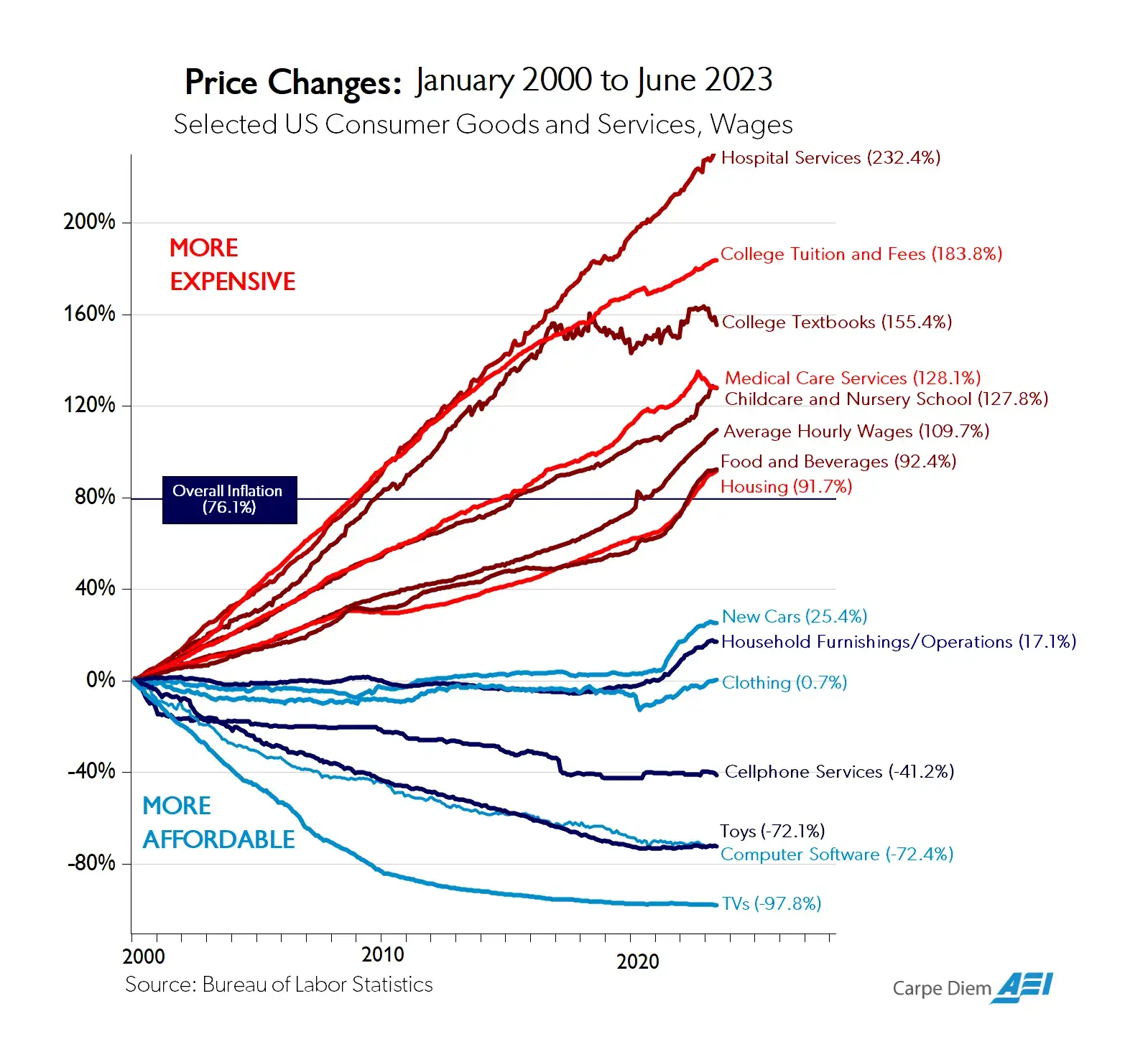- cross-posted to:
- nyt_gift_articles@sopuli.xyz
- cross-posted to:
- nyt_gift_articles@sopuli.xyz
Glad to see the Times still churning out utterly tone-deaf columns about kitchen-table economics.
I don’t care about what the statistics say about the economy; what matters is that all these available jobs are entry-level. The rate of inflation is largely irrelevant when I’ve been losing purchasing power since 2003 anyway. The real problem is that when I entered the job market, you had to have 15 years of experience to make middle-class wages in journalism, and 13 years into my career, everyone with experience had taken buyouts or been laid off, with those of us stupid enough to think editing wouldn’t die being shipped off to centralized production facilities.
Now, I can’t get a job paying a subsistence wage in any field. Either the algorithm finds me too old or data analysis and coding, which I understand to be in high demand, don’t count if done in a newsroom. I’m still supposed to have more than 20 years of career left and had to move into a vehicle because all the hard work one was supposed to do in one’s 20s for the later payout of a comfortable life with vacations and such just … doesn’t count.
I don’t care what the Fed does or who’s in the White House; I care about being able to afford more than bologna sandwiches for every meal having already given up housing. That much should not be difficult to understand.
Journalism has been utter hell as a place to make a living for the past 20 years. Online platforms broke the local oligopolies on commercial speech and classifieds, and left that money in the hands of a few newly-minted billionaires instead of journalists. I don’t see that as the result of the Biden administration or their policies.
By 2003, most newsrooms were already owned by chains. Readers didn’t know this, as I found out when I took over as news ed in a small town after a corporate acquisition. Pitchforks galore (and on a long enough timeline, their fears were founded in that it was functionally subsumed by the already-owned larger nearby sister paper), but we’d been sold by fucking CapCities, not some local eccentric publisher/owner/gadfly.
And the journalists never got the big bucks.
Craigslist was encroaching on smaller and smaller markets. We’re pre-Facebook here, so there’s still plenty of time to abandon classifieds as a sunk cost and right the ship, but instead of using the diversity of markets and demographics to foster an era of experimentation in delivery methods and pricing, we pretty much got “we tried nothing, and it’s not working” as the excuse to accelerate consolidation.
Gannett’s finally catching up to Sinclair in brazenness such that we can all see the endgame, but the end of local control was going to mean a similar result regardless of where the Web taking off ended up falling on the timeline.
Good reporting carries risks for shareholders, especially those of the institutional variety.
CL had also gone to garbage, with realtors and auto dealerships and crappy service industries posting crappy jobs. I’m hoping classifieds will come back.
That’s wholly* unacceptable. I tried to boost your comment **, but I keep getting an error message with no specifics. You deserve to be heard across instances.
- Corrected autocorrect wtfery
** twice more corrected words
Oh look, another article about how the plebs are whiny for no good reason. Haven’t the masses heard? The numbers look good and Goldman Sachs said the hard part is over.
NYT are really not hiding their complicity anymore.
I started working in a grocery store about a year before the pandemic. I’ve seen prices of food double in some cases. My pay has only gone up $2 due to the minimum wage in my city increasing. $2 raise in almost 5 years. I can no longer afford to shop at the store I work at, it’s insane. I have no idea how this article can pretend things are remotely ok for the common person. I’m sure higher ups/managers are just fine, but not the rest of us.
Wages at the bottom end of the scale haven’t been ok since Reagan decided to break things. Biden hasn’t managed to fix this; he was the moderate candidate who wasn’t willing to break the billionaires. And even if he had been, at no time during his Presidency have we had a Congress which was willing to go back to taxing the wealthiest at rates high enough to redistribute wealth back down the ladder.
The answer to that is under no circumstances to go choose somebody in a party whose core promise is to transfer even more wealth to the richest.
That’s what’s called gaming the statistics. Actual purchasing power has been declining at a significantly higher rate as wages increased the net result being you can buy less stuff for more money. Fluffy articles citing feel good statistics dont matter.
It’s the standard statistics about wages and price levels that we’ve been using for decades. I don’t see any evidence that they’re gamed, though I don’t doubt that there are some people for whom what you describe is true
CPI for example likely isn’t being gamed, (I hope). There have been changes to the CPI so whoever made these does have the ability to push it into a certain direction. What I meant was, for a random fluff article I simply pick any of my favorite CPI categories and spin those to suit my main point.
Which is why Krugman is using CPI, and not some random category. He’s smart enough to avoid that kind of pitfall.
Unemployment is low because potential workers have either given up and stopped looking for work or are working literally anything because they will starve if they don’t; neither option lends itself to satisfaction with the economy. Labor participation rates have only just barely gotten back to their pre-pandemic levels, but a lot of people burned any savings they had to keep their heads above water, so on the whole they’re still further behind than they were 4 years ago, and they know it, but Krugman never cared to ask a real person, so he has no clue.
Low inflation is meaningless when economic mobility is lower than ever, with education and healthcare dropping in quality and availability while increasing in price much faster than the average. Most small businesses that went bankrupt due to pandemic half-measures have not reopened, because unlike billionaires, when regular people without an army of lawyers declare bankruptcy, they actually lose everything. In spite of all this, clueless clowns who barely know how to look at numbers on spreadsheets write articles wondering why regular people aren’t satisfied with such a great economy, and concludes a better outcome was impossible.
His only mention of consumer prices is an aggregated consumer price index, which is a “mere” 19% increase over pre-pandemic levels, and from that he concludes people are dumb babies because wages rose by about the same amount. This take is particularly insulting because he has definitely seen this chart and the numbers it’s based on:

If that’s a great economy, I’m a firebreathing dragon.
Yep, goods went down in price, services and housing went up in price. Given what people actually buy…it’s been a few percent per year increase in overall prices, which is what your chart from a right-wing think-tank is designed to hide.
🤖 I’m a bot that provides automatic summaries for articles:
Click here to see the summary
The simple reality of the past year or so is that America has accomplished what many, perhaps most, economists considered impossible: a large fall in inflation without a recession or even a big rise in unemployment.
At this point, however, with a soft landing looking ever more plausible, it seems as if the council, while it underestimated the size and duration of the shock, got the basic story right.
Unfortunately, we don’t have consumer sentiment data for the 1940s, although some political scientists believe that the economy actually helped Harry Truman win his upset election victory in 1948.
Also, it seems worth noting that many voters have demonstrably false views about the current economy — believing, in particular, that unemployment, which is near a 50-year low, is actually near a 50-year high.
And everything we know from history suggests that trying to impose deflation — falling prices — on large parts of the economy would have had disastrous effects on employment and output, something like the quiet depression Britain inflicted on itself after World War I when it tried to go back to the prewar gold standard.
What I can say is that if you believe that Biden made huge, obvious economic policy mistakes and could easily have put himself in a much better position, you probably haven’t thought this thing through.
Saved 76% of original text.






